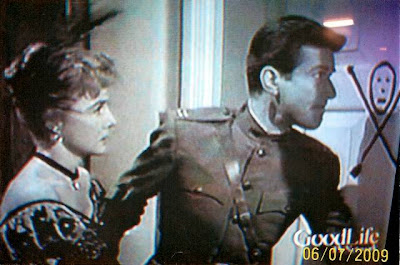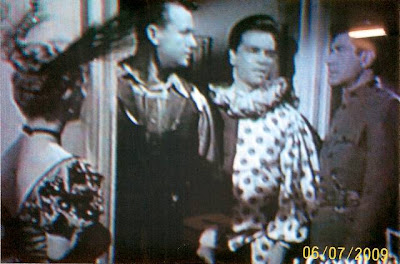



"The Loser" opens with professional tennis player and government agent Kelly Robinson (Robert Culp), against the background of the Crown Colony Tennis Club in Hong Kong, on the telephone with his best friend and fellow agent, also a polyglot and translator, Alexander Scott (Bill Cosby), who has been posing as Robinson's personal trainer. "Where'd you disappear to, Scotty?," he asks in his typically lighthearted style, "We've got a tip on another shipment of heroin--two million dollars worth!" But the normally free-wheeling Scott is unusually somber: "I can't go to work right now--I ran into a little trouble," as he has become the captive of members of an international drug cartel.
The scene then switches to a Hong Kong nightclub in which the sultry singer Angel (Eartha Kitt), having imbibed yet another glass of liquor, and puffing anew on her ever-ready cigarette, is performing a very contemporary rendition of Cole Porter's Easy to Love, being clearly a hit with her audience. At the same time, Scott, now a prisoner of the cartel, has been trussed-up and tied face down to the bed in her makeshift dressing room.
Meanwhile, Robinson has solicited of Hong Kong mercenary Jimmy (Mako) in creating a package as decoy, "I just want it to float. This is the most important thing you've ever built for us. If it isn't perfect, there isn't going to be anymore us. It has to be innocent looking; to pass on the street and nobody knows it's there."
Angel is now on break, and clearly in need of another "fix." She comes to her dressing room and views the immobilized Scott nonchalantly, seemingly oblivious to his suffering. "I seem to be having trouble with the laces here. Angel--that's your name; yeah, you're in the movies aren't you?" She merely comments, plaintively, "Almost," and departs for the stage, this time to perform a melancholy, almost detached rendition of a Sarah Vaughn staple, Black Coffee. Soon afterwards, Ramon and his thugs have returned, and proceed to pummel the restrained Scott, hoping to obtain some information on the intercepted shipment of heroin, but of course to no avail. Then, left alone with Angel once more, this time Scott entices her to release him, proffering to her a hallucinogenic pill in his pouch.
Ramon, speaking with his compatriots in the drug trade, including the laconic boss "General Chu" (Joseph Kim), peremptorily states "It goes well," even as he is informed that he is about to be removed from their coterie. "But the American is here," he argues, "There's nothing to be disturbed about. I have everything under control. How can I set my General's mind at ease?" The boss acidly commands that the matter with Scott be disposed of, by any means.
Scott, having escaped with Angel in tow, tries to seek to amuse a guard assigned to an exit: "You remember me from last year--name's "Loser, Honorable Loser," (itself a further reference to the title, and its multiple meanings) in ladies' undergarments, from Philadelphia." But he is apprehended by Ramon's thugs once more, but not before being offered a huge pipe of hallucinogens from the one called Old Man (Rajnun K. Tsukamoto). Meanwhile, Robinson has been apprehended as well, discovered to have concealed himself into a large tin can presumably carrying heroin (evidently one of the ruse packages of the mercenary Jimmy). Now the agents are both trussed-up lying beside each other. Robinson quips, referencing Stan Laurel and Oliver Hardy comic predicaments, "Well, here's another fine mess you've gotten me into." Scott laments, "Sorry about that, Ollie." Then, recalling that it was Robinson who had been ordered to come to his aid, retorts, "You can't do anything right, can you?" Still, Scott ingeniously pries loose Robinson's harnesses by way of his teeth.
The sadistic Ramon, whose control over Angel has become a sexual high, ignores her entreaties for yet another "fix," and orders her to "go back and sing some more." While moving quickly to finally squelch the drug cartel, Scott commiserates with Robinson on how the Ramon and Angel relationship has affected him: "The cat's name is Ramon. The whole world's his junkie. And there's a girl, Angel. She doesn't mean anything to me; just a lovely loser, and I come from a long line of losers."
Preparing for the returning thugs, the agents feign to be yet securely fastened. Angel has been left alone with them, in the hope that in permitting their escape the cartel can follow them to the missing shipment of heroin. Of course the agents are aware of this tactic, and create the illusion that they are themselves at odds. Scott emphasizes "I know where it is; he doesn't. Now, you untie us so we can get to it!," he orders her. As if slighted, she remarks: "I don't know what you're so mad about." Knowing that they are being closely followed, the agents move quickly on the busy streets of Hong Kong. Their appointed designation is a brothel house and once there they are playfully offered the companionship of Lilly and Barbara (Linda Wong and Nancy Wong), but Robinson jokes "Would you excuse us? We have to go and powder our noses."
But while the shipment has been successfully intercepted, Scott is unable to simply abandon the hapless Angel. With Robinson keeping Ramon and his thugs at gunpoint, Scott rejoices in delivering to her the freedom he assumes she has long yearned for. He is shocked to learn, instead, that she has no desire to leave her current environment. Ramon jeers: "That's what you came back for? She's free. Go ahead, Angel, have fun. Get yourself a new life!" But she pitifully admits that she can never return to what she had before. "Home? Eight people sleeping in a room and garbage out in the hallway. You call that home?" Nodding toward Ramon, she reveals, "Now, he needs me. I know he knocks me around a bit, but I know where I stand." Turning toward Scott she concludes: "Not like you, some Boy Scout. Listen, you dummy, I get three squares and a place to sleep and no more. So long, hot shot. Sorry I caused you so much trouble." Ramon seizes upon her rejection of Scott's offer: "She doesn't want to be saved. You're the poor loser, my friend." But even a punch to Ramon's jaw--just before the authorities arrive--cannot assuage the heartbroken agent.
Afterwards, at a local pub, Robinson simply asks "Are you alright?" Scott responds by giving the bartender his two gambling chips, commenting, as if what had happened were all a game of Monopoly "Put that for two houses and a hotel, and Marvin Gardens. . . ."
"The Loser" is clearly one of the finest of all episodes in a landmark series that shattered racial barriers and poignantly questioned accepted mores and allegiances. Culp's unpretentious script delves upon the several meanings of "loser," but it is very much a winner, and is capped by a searing performance from Eartha Kitt, caught at the very peak of her trademark sultry form.














 Below: Ms. McCay, an OBIE winner for her work in a 1956 New York theatre production of Anton Chekhov's "Uncle Vanya," and an Emmy Award winner for her role as as the incarcerated homeless woman Irene Hayes in "State of Mind," a 1991 episode of the series "The Trials of Rosie O'Neill," which featured Sharon Gless in the title role, has been a twice-elected member of the Board of Governors of the Academy of Television Arts and Sciences." Besides her long-standing role as Caroline Brady in NBC's soap opera "Days of Our Lives," the actress never ceases to assume key vitalizing roles on stage and television. She portrayed James Dean's instrumentally influencing grandmother in a TNT telefeature "James Dean: An Invented Life," directed by fellow live drama acting veteran Mark Rydell, first airing on August 5, 2001. That telefeature turned out to be the star-making vehicle for James Franco, who received an Emmy for portraying the legendary James Dean; the real Dean having appeared with Ms. McCay at New York's celebrated Actors' Studio. A strong advocate of the live theatrical experience, Ms. McCay appeared as "The Swan" in a much-acclaimed opening play of science fiction master Ray Bradbury's dramatized trilogy of tales under the broader title "The Time of Going Away," debuting on March 14, 2003 at the Los Angeles Court Theatre," as the card advertisement below prominently displays.
Below: Ms. McCay, an OBIE winner for her work in a 1956 New York theatre production of Anton Chekhov's "Uncle Vanya," and an Emmy Award winner for her role as as the incarcerated homeless woman Irene Hayes in "State of Mind," a 1991 episode of the series "The Trials of Rosie O'Neill," which featured Sharon Gless in the title role, has been a twice-elected member of the Board of Governors of the Academy of Television Arts and Sciences." Besides her long-standing role as Caroline Brady in NBC's soap opera "Days of Our Lives," the actress never ceases to assume key vitalizing roles on stage and television. She portrayed James Dean's instrumentally influencing grandmother in a TNT telefeature "James Dean: An Invented Life," directed by fellow live drama acting veteran Mark Rydell, first airing on August 5, 2001. That telefeature turned out to be the star-making vehicle for James Franco, who received an Emmy for portraying the legendary James Dean; the real Dean having appeared with Ms. McCay at New York's celebrated Actors' Studio. A strong advocate of the live theatrical experience, Ms. McCay appeared as "The Swan" in a much-acclaimed opening play of science fiction master Ray Bradbury's dramatized trilogy of tales under the broader title "The Time of Going Away," debuting on March 14, 2003 at the Los Angeles Court Theatre," as the card advertisement below prominently displays. 


















